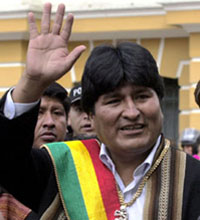Bolivia's Morales celebrates one year in power studying new nationalizations
The President of the poorest country in South America sent a bill to raise taxes on foreign mining firms to Congress.

On Monday, President Evo Morales celebrated one year in power. During the last twelve months, the leftist leader who became the first in ruling Bolivia introduced radical reforms that have shaken up this embattled Andean nation. In only 52 weeks Morales nationalized the energy industry, inaugurated a Constituent Assembly and is now weighing the nationalization of the mining industry and a land reform.
Evo Morales said on Monday he had sent a bill to raise taxes on foreign mining firms to Congress. "We have sent a bill to modify the Complementary Mining Tax," Morales told lawmakers during his annual address in Congress. "Mining resources must benefit the country and not just exporting companies."
He did not elaborate on the proposal, but said his reforms would amount to a "second nationalization" of the investment-hungry sector, which last year registered exports worth $792 million. Morales also renewed his pledge to "recover" the country's largest tin smelter, known as Vinto, once a state-owned company that was acquired by Switzerland-based Glencore in 2005. He blasted that deal as a "fraudulent sale of the state's patrimony."
The initiative is expected to hit US interests in the country, as foreign mining companies with big projects in Bolivia include U.S.-based Apex Silver Mines Ltd. Also French and Canadian companies are operating in the country. On the contrary, the state-owned mining company COMIBOL will benefit from the increasing of taxes, as well form small and independent miners, who are an acting power in the highlands.
In a wide-ranging speech that lasted four-and-a-half hours, Morales also pledged to implement a controversial land reform that calls for the redistribution of a fifth of the country's territory to landless peasants. Government officials have said only idle or unlawfully acquired land will be seized for redistribution, but it has outraged large land owners in the opposition stronghold of Santa Cruz, who fear their properties might be targeted.
Morales radical initiatives have led to a strong opposition from six out of nine governors. Recently, the decision of the governor of Cochabamba to ask for autonomy from the central power in La Paz sparked street protests and clashes that left two killed, many injured and fears of civil war among if tension grows.
In the Eastern regions of the country, where opposition to Morales is strong, daily calls for autonomy shatter Evo's attempts to deepen even further reform longly claimed by the poor indigenous majority. The questionj over the property of the mining resources and the land will also meet the tough opposition of Morales' foes inside and outside Bolivia.
Hernan Etchaleco
Pravda.ru
Subscribe to Pravda.Ru Telegram channel, Facebook, RSS!




